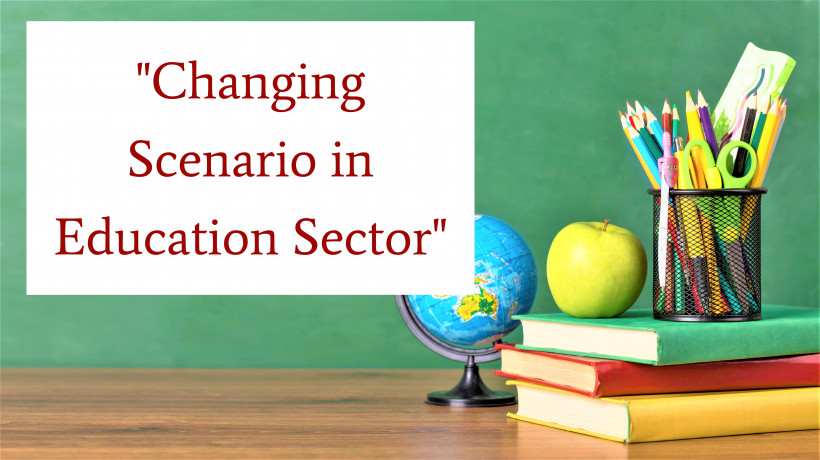Changing Scenario in Education Sector
India is focusing in a big way for “AtmaNirbhar Bharat”. Developing the latest skills in manpower will help India to achieve this objective of education sector.
January 17, 2022

Career Expert & Blogger

Flexibility in India education system
One important change which is to be a permanent feature of the Indian education system is flexibility. Most of the courses offered by any Indian University have a single entry and single exit opportunity.
Pandemic told us about uncertainty in life. Therefore, the higher education system needs to be more flexible, where multiple entries and multiple exit opportunities are possible. The second important change is to be around education opportunities for working professionals.
This is a good opportunity for the Indian education sector to become a global education centre. Indian institutions were late in adopting technology. Pandemic has forced Indian education stakeholders to adopt technology in all possible manners.
Whether it is known as Executive education, continuing education, or with any other name, this segment of education needs more attention. If properly addressed, executive education which is only limited to business education can be extended to technology and science education also.
India is focussing in a big way for “AtmaNirbhar Bharat”. Developing the latest skills in manpower will help India to achieve this objective.
Examination system in India
There are some areas of concern also. The examination subsystem requires more attention. The final examination requires proctoring. Edtech solutions are developing various AI-based solutions for better proctoring in online examinations.
But no such solution is as close to as physical examinations. This allows revisiting the evaluation system based on the final written examination. Assessment of students in a class should be a regular process. It will also help in better learning.
Regular assessment should be designed in such a way that should create interest in education. Assessment should be integrated with the learning process. It is certainly high time to revisit the assessment process to reduce the examination phobia and also to facilitate better learning.
Competitive admission process
The admission process in India is highly competitive. It creates so much pressure on the child that affects the actual learning process. Students have become more objective to crack a particular entrance examination.
Since pandemic has disrupted the routine coaching industry and most of the students are studying at their home. It should be another game-changer for the Indian education sector, where dependence on coaching can be minimized.
If we revisit the process of entrance examination which can check the holistic personality of students for a particular programme rather than just checking some tricks to solve objective type questions. To assess a large number of applicants, we prefer objective assessment, but it has many drawbacks.
There is always a trade-off when we deal with a large number of applicants. Can we think of admissions to UG courses based on class 12th performance across the disciplines? Maybe it is time to work on these points.
As we say that there will be new normal after the pandemic. The Indian education sector will become more tech-savvy, flexible, focusing on continuous assessment rather than on the final examination, enabling different types of executive education and admission process which is more student-friendly.
Online learning is here to stay
An immediate and effective response to the crisis was to go digital. Developing robust online platforms has become necessary to offer continuity in learning. Yet in a developing country like India with vast disparity in socio-economic backgrounds of students and the quality of educational institutions, the shift has not been easy. The digital divide has been further widening the gap, and needs urgent attention from both public and private sector players as the crisis continues. Good teachers, refreshed curricula and effective tools will ensure students stay involved and active in the learning process.
New trends in teaching & learning will emerge
Beyond the top band of institutional excellence with private universities setting best practices, Indian academia has been in need of transformation, long before the onset of the pandemic. There is an opportunity to rethink the traditional education system now.
Digital learning is leading the charge as a mainstay, and many new trends are picking up momentum across the globe. Multidisciplinary and modular pedagogy that afford transferable skills and customised learning will succeed. Post-pandemic times could see a blend of e-learning and mainstream face-to-face teaching with a boost from traditional universities and the ed-tech sector.
A call for greater global collaboration between students, academia & industry
Opportunities for student mobility and practical exposure through exchange programmes, internships, participation in conferences, and more could likely be off the table for some time. Innovative new forms of collaboration and alternative paradigms are needed to drive learning, research and teaching. Sharing of knowledge between institutions globally through joint-teaching, virtual guest lectures, etc. could give students an enriched global perspective in these difficult times.
Will educators rise to the challenge?
A paucity of contemporary teachers has been a pressing challenge already, and it is growing more serious. Faculty are being called upon to redesign course content to meet the current and future needs. Moving away from traditional pedagogies in most average institutions, the demand for quality educators will shape the way higher education moves forward from this crisis

